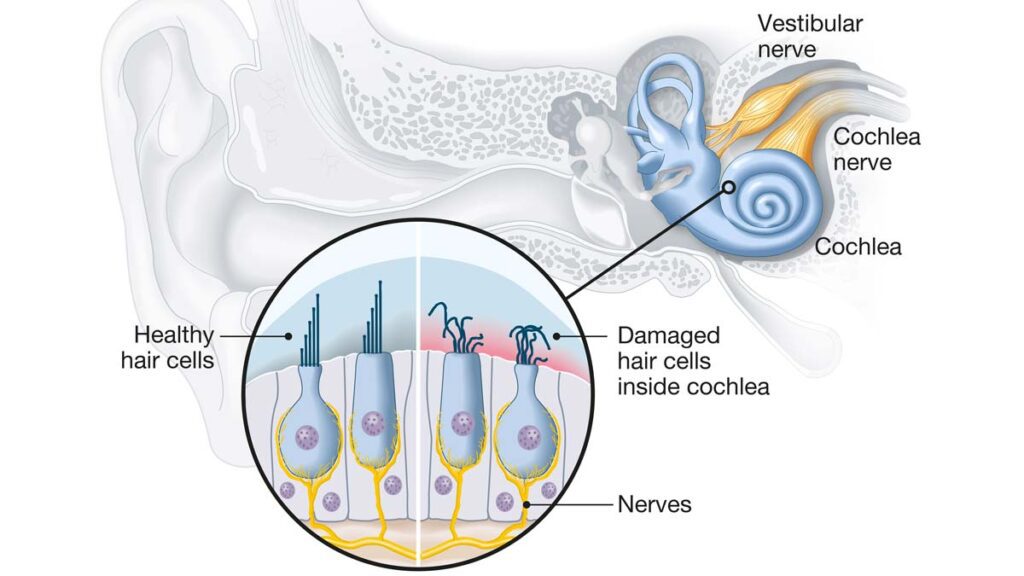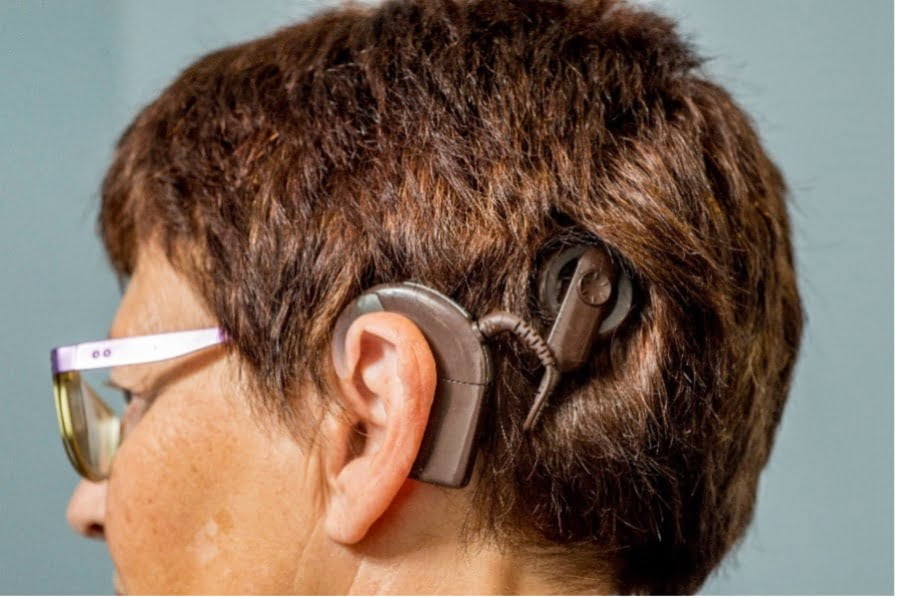Linking hearing loss and tinnitus can seem like a given, but there are many different ways that hearing loss and tinnitus can be tied. One of the ways these two ailments are connected is through sensorineural hearing loss, or hearing loss that comes as a result of damage to the inner ear. This particular type of hearing loss causes hearing impairment that can be accompanied by tinnitus (but may not necessarily be tied to the condition). To fully understand how the inner ear and tinnitus interact, let’s take a look at both conditions and the way bilateral or unilateral tinnitus can be linked to hearing loss.
What Is Sensorineural Hearing Loss?

Sensorineural hearing loss is one of three types of hearing loss. One type of hearing loss is the source of common ear concerns, and is called conductive hearing loss. In conductive hearing loss, loss occurs as a result of mechanical issues in the outer ear or middle ear. Common causes of conductive hearing loss include a middle ear infection, swimmer’s ear, and having a hole in the eardrum.
"Treble Health helped me reduce my tinnitus by about 80%, and now I can live my life again!"

"Treble Health helped me reduce my tinnitus by about 80%, and now I can live my life again!"
– Steve D.
Book a free consultation to learn which Treble Health solution is right for you. Join Steve and thousands more who have found lasting tinnitus relief.
The second type of hearing loss is called sensorineural hearing loss and is a type of impairment that involves the inner ear. When the inner ear’s hair cells found within the cochlea (the “sensory” component), or auditory nerve (the “neural” component), are damaged, this type of hearing loss will result. Most people develop this type of hearing loss over time, and it is often referred to as “age-related hearing loss.”
There is another type of loss that combines each of these, the aptly named mixed hearing loss. Mixed hearing loss affects individuals with symptoms from both sensorineural hearing loss and conductive hearing loss, and may require treatments that differ from single-source causes of hearing loss. Neither are necessarily considered permanent hearing loss, and all can be the result of external sources like injury, exposure to loud noise, and more.
How Is Tinnitus Related to Sensorineural Hearing Loss?
Although we don’t know exactly how tinnitus is generated for everyone (and it is likely that there may be different mechanisms in the brain responsible for the generation and perception of tinnitus in different populations), we do know that there is a relationship between sensorineural hearing loss and tinnitus. Hearing loss and tinnitus are linked, regardless of the precise type of hearing loss being experienced, but there are specific mechanisms that may be behind the tie between tinnitus (including both mild and severe tinnitus) and sensorineural hearing loss.
While there is still much that needs to be investigated to fully understand the origins of tinnitus, one popular theory about tinnitus explains that tinnitus happens when our brains try to compensate for hearing loss by generating their own sound energy. Using this explanation, hearing loss is the root of the problem but the issues presented by tinnitus actually originate in the brain and abnormal neural activity. This portion of the brain processes sound, separating pertinent information from background noise, and is called the “central auditory system“.
Acute and chronic tinnitus involve the central auditory system and possess specific risk factors. The most common of these risk factors includes hearing loss, noise exposure, and mental health issues, such as depression and depressive symptoms. Some can be targeted using a hearing aid, others require minimizing noise exposure, and still others require more invasive procedures within the ear canal. Addressing the root causes of loss can help target tinnitus, whether that means utilizing a hearing aid, using cochlear implants, or focusing on therapies designed to target mental health issues and tinnitus.
What About Sudden Sensorineural Hearing Loss?
There are times when a person suddenly develops hearing loss for no discernible reason. This is referred to as “idiopathic sudden hearing loss”. The word “idiopathic” means that we don’t know the cause of the problem. Some think that sudden sensorineural hearing loss may be caused by a viral infection. It is usually treated with steroids, although some people do not recover their hearing even when they receive treatment soon after the onset of symptoms. If the hearing loss does not resolve, the person would then be a candidate for hearing aids or cochlear implants to minimize the effects of hearing loss.
People who experience sudden sensorineural hearing loss may also experience other symptoms such as tinnitus or dizziness. Research indicates that people with mild to moderate levels of sudden hearing loss who experience tinnitus are more likely to experience resolution of their tinnitus after a few months. However, if the sudden hearing loss is more severe (in the severe to profound range), the associated tinnitus is less likely to recover.
Individuals who experience sudden hearing loss should seek medical care immediately. Treating the affected ear within a short period of time after the onset of the sudden hearing loss is thought to improve the likelihood of recovery and reduce the likelihood of developing chronic tinnitus.
While noise exposure and damage to the ear canal or middle ear may not initially seem problematic, the ears require a delicate dance in order to function properly. Even small amounts of damage can lead to hearing loss and tinnitus and prompt the need for intervention for hearing loss and tinnitus retraining therapy.
What Is the Relationship Between Tinnitus and Profound Sensorineural Hearing Loss?
Many individuals with profound hearing loss report symptoms of tinnitus. For these individuals, it may be more difficult to alleviate their tinnitus using environmental sounds because it will be much more difficult for them to hear the sounds around them. Instead, more significant interventions may be necessary. These may include hearing aids, therapy, and other interventions provided by a qualified audiologist.
Some individuals with profound hearing loss choose to pursue a cochlear implant. Although the primary reason for pursuing a cochlear implant is to improve hearing, many individuals report that their tinnitus is also improved after cochlear implantation. Those with severe tinnitus symptoms may be most likely to improve in these circumstances. Because an implant is invasive, it is important to make sure all hearing impairments are treated appropriately, and invasive measures are only used in cases which warrant them.
Does Noise Exposure Cause Sensorineural Hearing Loss and Tinnitus?

Noise exposure is one of the known risk factors for hearing loss and tinnitus. When hearing loss and/or tinnitus are attributed to noise exposure, they are referred to as “noise induced hearing loss” and “noise induced tinnitus.” It is common for individuals with noise induced hearing loss to have a pattern of high frequency hearing loss that comes on gradually. Many occupations (e.g., military service member, musician, dentist, construction worker) and activities (e.g., hunting, motorcycle riding, use of power tools) expose people to loud noises that can cause hearing loss and tinnitus.
Although anyone can experience noise induced hearing loss or tinnitus if exposed to high enough levels of noise for a long enough period of time, some people may be genetically predisposed to higher levels of hearing loss or a higher likelihood of experiencing tinnitus. Although loud sounds and high pitched sounds are both problematic, many people fail to understand how vital it is to avoid loud noises when possible, and correspondingly avoid having to seek out tinnitus treatment. Not all loud sounds will lead to tinnitus, but there are enough studies that demonstrate the hazards of regularly being exposed to loud noises.
Can Someone Have Tinnitus Without Having Sensorineural Hearing Loss?
It is possible for a person who has been exposed to high levels of noise to have normal hearing sensitivity even when they perceive tinnitus. Recent research in this area has focused on identifying clinical measures that may provide more information about how this can occur. Recognizing the presence of this type of tinnitus due to damaged hair cells without bilateral hearing loss is vital, as not everyone with tinnitus will experience severe hearing loss, bilateral or unilateral hearing loss, or require measures to treat hearing loss. Instead, some people with tinnitus hear sounds in one ear or both without negative impacts to hearing, and may still benefit from hearing aids and other measures used to affect hearing.
What Is the Treatment for Hearing Loss?

Although many forms of conductive hearing loss and mixed hearing loss can be managed medically or surgically, sensorineural hearing loss is treated with hearing aids or cochlear implants (with the exception of sudden sensorineural hearing loss, as mentioned above, which is treated as soon as possible with steroids). Fortunately, individuals who wear hearing aids and cochlear implants often report that their tinnitus becomes less noticeable when they are using their devices. Treating hearing loss will depend on the duration of impacts to normal hearing, the reason for the onset of hearing loss, and even whether or not the individual is also a tinnitus patient. Treatment will most likely include some variation of implement or implant, and may also involve steroids and other medicinal interventions.
What Should I Do If I Think I Might Have Sensorineural Hearing Loss and Tinnitus?
If you are showing symptoms of hearing loss or tinnitus, schedule a consultation with an audiologist, who can evaluate your hearing ability and assess your tinnitus. They may also use questionnaires to evaluate how the tinnitus is impacting your life or how high your level of tinnitus distress may be (e.g., Tinnitus Handicap Inventory). Your audiologist can discuss appropriate treatment options to target one or both of these conditions, to alleviate bilateral or unilateral hearing loss and minimize the presence of a trademark tinnitus sound.
Conclusion
Hearing impairment and tinnitus are frequently linked. From age related hearing loss to conductive hearing loss and a mixed combination of symptoms, damages or changes to the middle and inner ear can cause changes to the way the auditory nerve processes information. Over time, these auditory nerve changes can lead to the onset of tinnitus, or ringing in the ear that may also sound like rushing, shrieking, and other internally discerned sounds. Tinnitus patients are not necessarily synonymous to hearing loss patients, but the two populations frequently overlap. Treating subjective tinnitus may require first treating any disorders of the central nervous system, avoiding or minimizing the likelihood of noise exposure leading to sudden deafness, and employing different interventions like sound therapy.
Not everyone who experiences inner ear damage and subsequent sensorineural hearing loss will go on to develop further damage to the ear canal and require progressive tinnitus management on top of hearing loss treatment. Treating tinnitus can mean managing a traumatic brain injury that led to a disconnect between the small hair cells within the ear and the brain, or treating hearing loss that has occurred following inner ear damage. Some clinical trials have demonstrated that tinnitus treatment is most effectively completed when the hearing problems at the root of hearing loss are identified and resolved, rather than focusing treatment of tinnitus alone.
Next Step: Book Free Consultation
- 75% of patients reduced their tinnitus within three months after following our recommendations.
- "I feel like Treble Health literally gave me my life back." - Randy S. (verified customer)
- Join thousands of people who have reduced their tinnitus after scheduling a free consultation.












